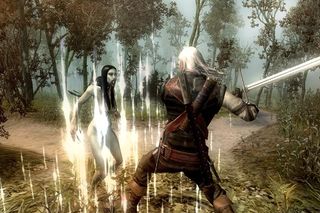Let's face it: fantasy RPGs have been in a rut. We get it, already: Elves are slender and noble, Dwarves are boozed-up walking beards, and Good must triumph against the forces of Evil. Enter the works of Andrzej Sapkowski, author of the best-selling Polish stories The Witcher is based upon. Though largely unknown to Western audiences, Sapkowski takes Tolkien's seminal fantasy archetypes, and amps up their relevance by injecting potent modern themes like terrorism, racism, substance abuse, and grey area morality.

Geralt isn't your standard-issue RPG hero, though you'd be forgiven for comparing him to fantasy D&D poster-boy Drizzt, what with the white hair and scowl. The Witchers are a nasty bit of business: mutated former humans trained expressly for slaying the nightmare nasties that nobody else has the stomach for.
You're viewed as little better than a necessary evil, so you won't see a lot of genuflection coming your way as you explore realistically designed medieval towns, seamless outdoor vistas, and dismal dungeons. It's small wonder that Geralt's chief concerns are his conveniently blanked memory, the heft of his coinpurse, and the notches on his bed post.
